The fitness app that couldn’t handle its own viral growth (spoiler: we fixed it)
- Overview:
- The Initial Challenge: Breaking Through
- Our Strategic Approach: Measured Aggression
- When Success Becomes Your Biggest Problem
- The Comeback Strategy That Worked
- 5 Critical Lessons for Mobile Marketers
- Conclusion
Last month, a campaign for our client in the health&fitness niche achieved a marketer’s dream — and a developer’s nightmare. Our keyword promotion was so successful that it nearly crashed their app. This experience taught us invaluable lessons about sustainable growth and the critical link between marketing success and technical infrastructure.
This isn’t a story of a “magic pill” for overnight success, but a case study about turning a major setback into a hard-earned triumph. By reading this, you’ll gain the knowledge to navigate real-world challenges and make them your own victory.
Why Fitness Apps Face Brutal Competition
Before diving into our specific strategy, it’s crucial to understand why the fitness app category presents such unique challenges on Google Play. The fitness app market has exploded in recent years, with thousands of apps competing for user attention. According to recent industry analysis, fitness and wellness apps represent one of the fastest-growing categories, but also one of the most competitive.
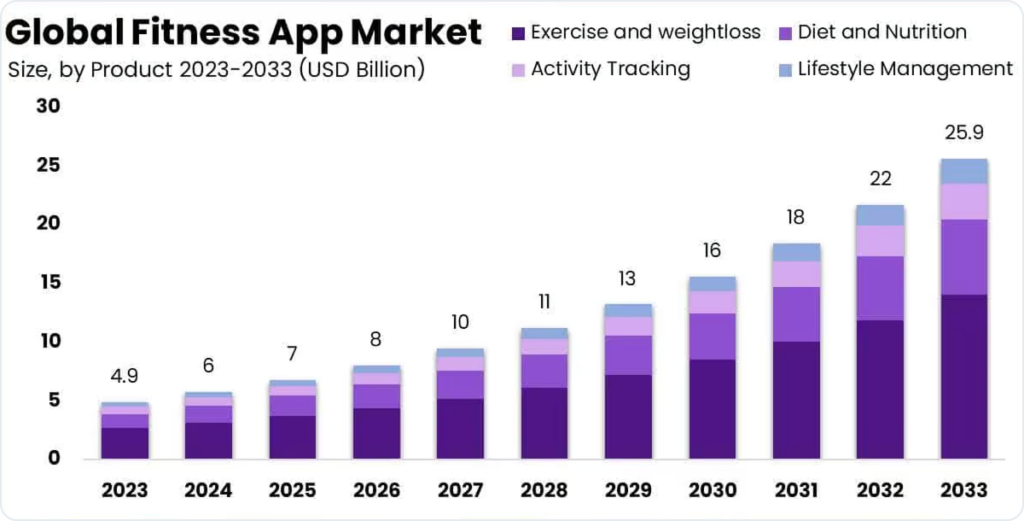
Top-4 Competitive Factors:
- Established Giants. Apps like MyFitnessPal, Nike Training Club, and Strava dominate high-volume keywords with massive marketing budgets
- User Acquisition Costs. Fitness apps typically face CAC rates 40-60% higher than average due to category competition
- Retention Challenges. Users expect immediate results and seamless experiences, making first-impression optimization critical
- Seasonal Competition. New Year resolution periods create intense keyword bidding wars
Understanding these challenges was crucial for developing our promotion strategy.
The Initial Challenge: Breaking Through
App Overview
- Category: Health & Fitness
- Platform: Google Play
- Target Market: English-speaking users (global)
- Unique Value Proposition: AI-powered personalized workout planning with real-time form correction
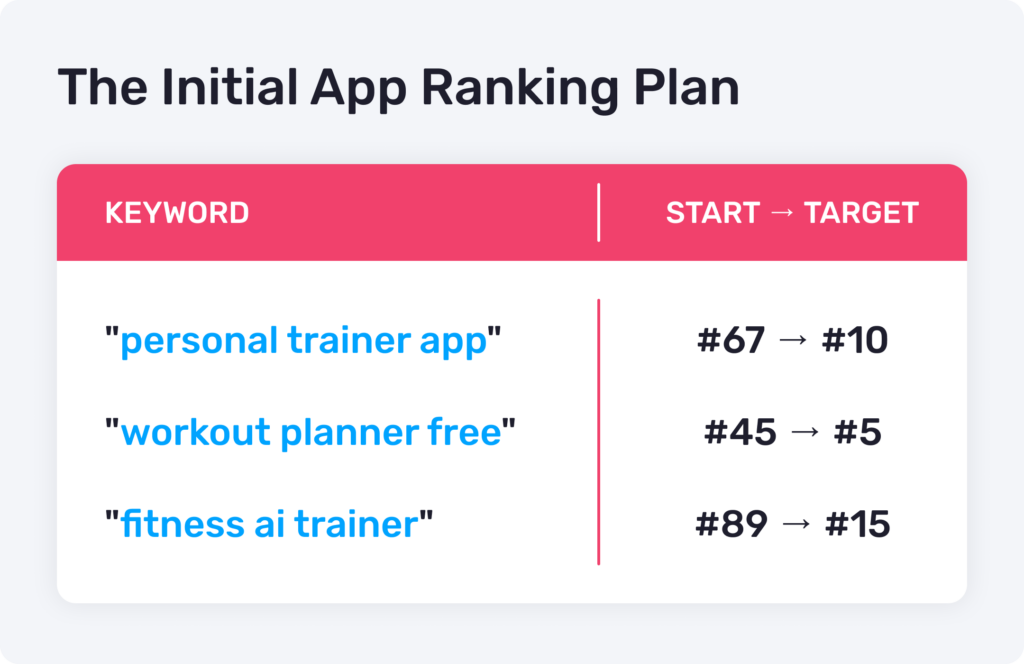
When the clients’ app approached Keyapp, they faced the classic startup dilemma: having a quality product but zero visibility in a saturated market. The fitness category on Google Play showed intense competition across all volume levels. Established apps occupied positions #1-15 for most valuable keywords, with newer entrants struggling to break into even the top 50. These targets were aggressive but achievable based on our experience with similar apps in competitive categories.
Our Strategic Approach: Measured Aggression
In week 1, we focused on building a strong foundation. This included a complete metadata optimization, where we suggest rewriting the app’s short and long descriptions to increase primary keyword density and boost conversion. Simultaneously, we tested low-competition, long-tail keywords to understand the algorithm’s behavior. We also worked in synergy with the client’s Google Ads campaigns, which amplified our promotion efforts and accelerated overall ranking improvements. With foundation elements in place, we launched comprehensive 5-day campaigns for each priority keyword:
“Personal Trainer App” Campaign
- Day 1: 180 installs
- Day 2: 220 installs
- Day 3: 250 installs
- Day 4: 280 installs
- Day 5: 330 installs
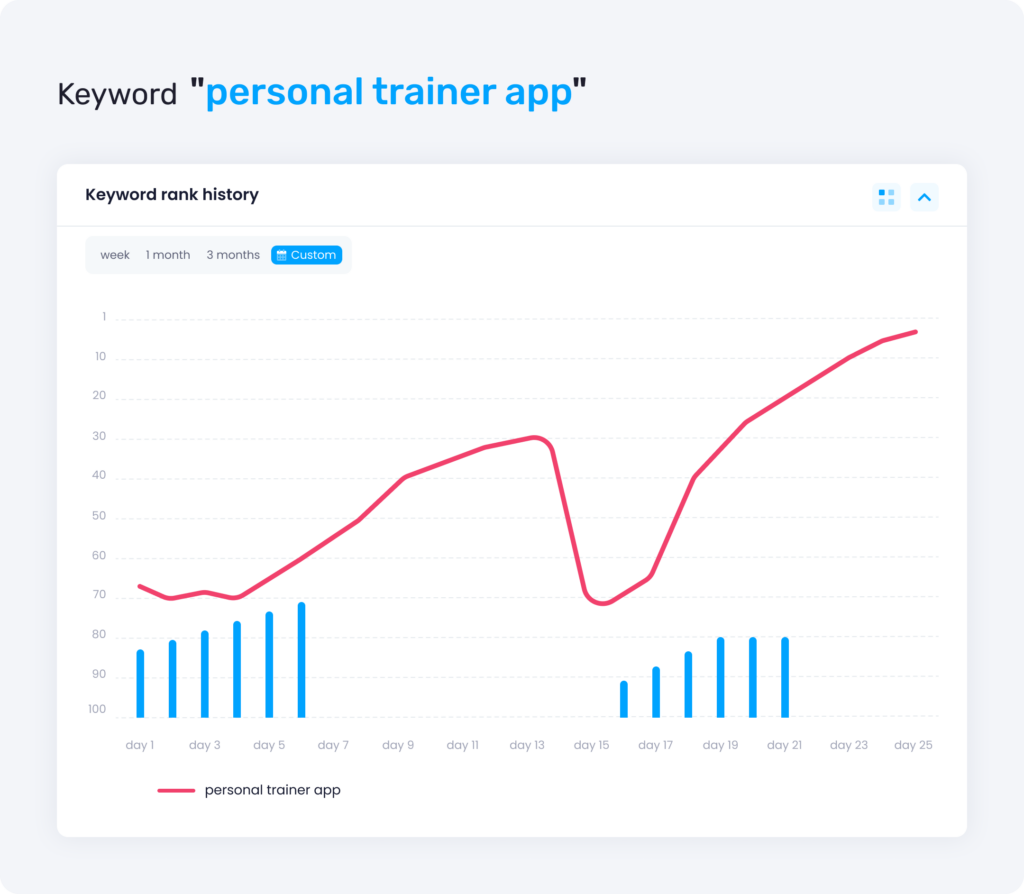
“Workout Planner Free” Campaign
- Day 1: 160 installs
- Day 2: 190 installs
- Day 3: 220 installs
- Day 4: 250 installs
- Day 5: 270 installs
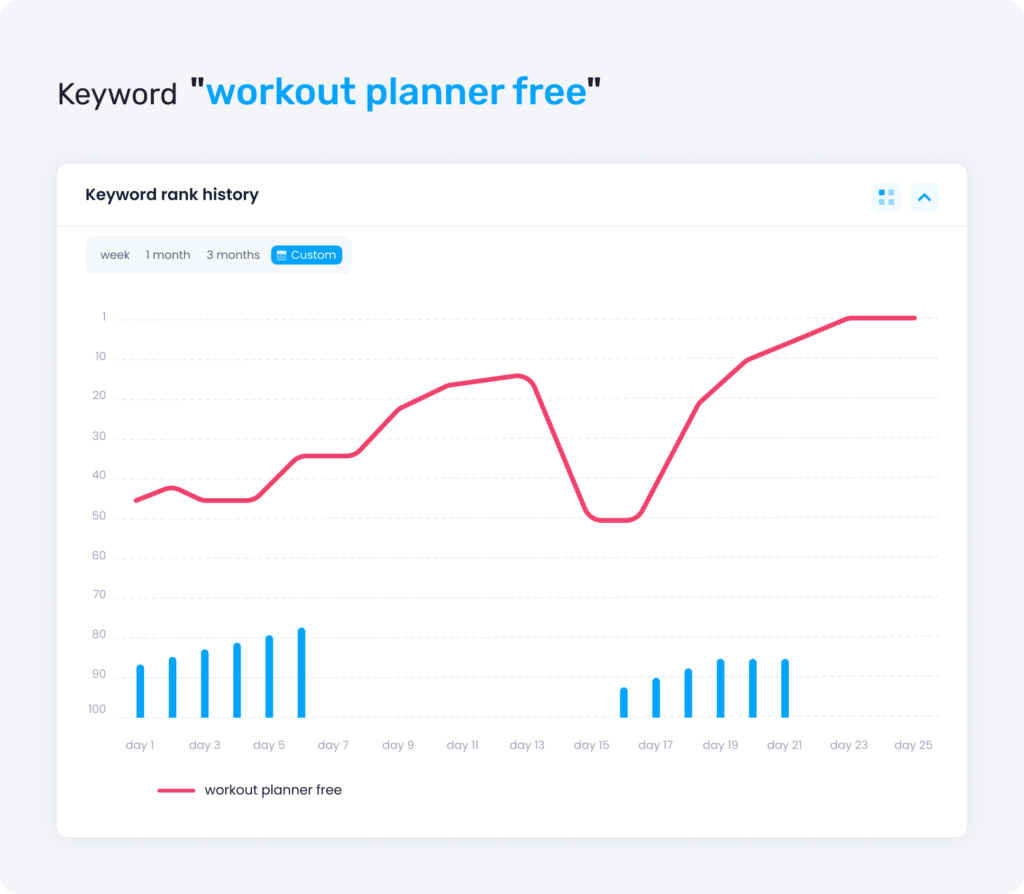
“Fitness AI Trainer” Campaign
- Day 1: 90 installs
- Day 2: 120 installs
- Day 3: 140 installs
- Day 4: 160 installs
- Day 5: 180 installs
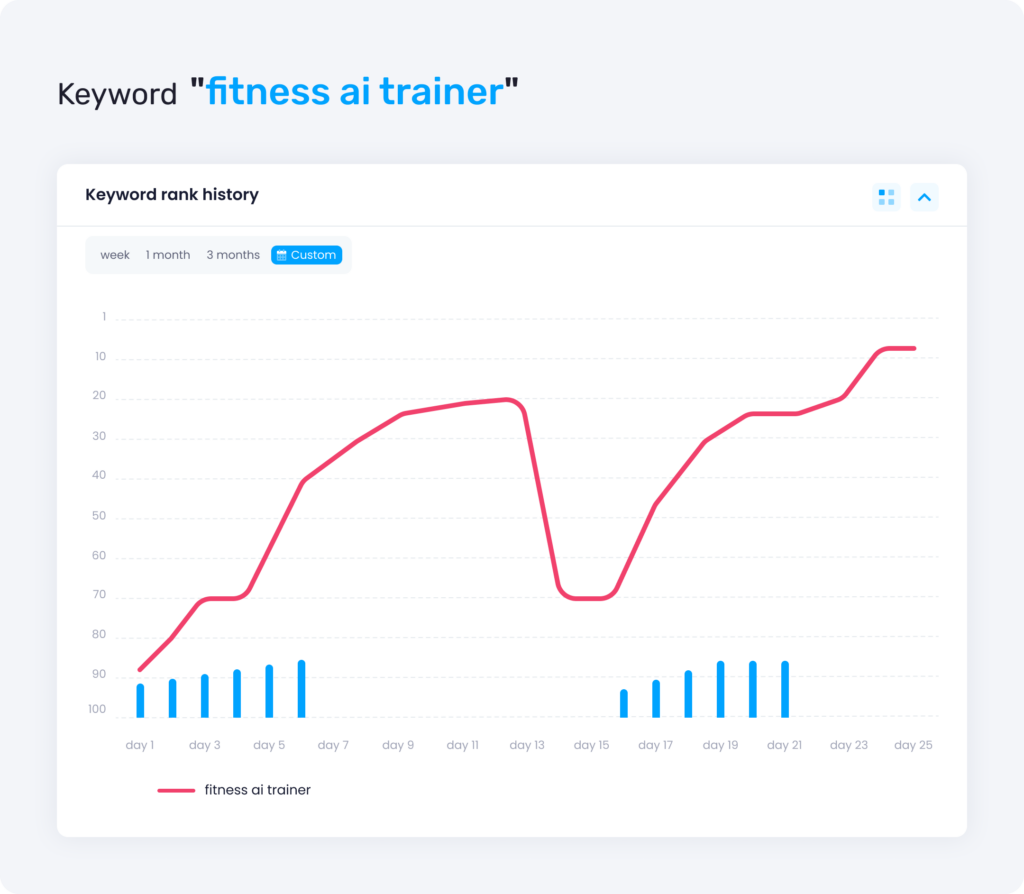
When Success Becomes Your Biggest Problem
In week 2 our campaign brought the results we’d hoped for:
- “personal trainer app”: Jumped from #67 to #28 in just two weeks
- “workout planner free”: Moved from #45 to #31
- “fitness ai trainer”: Climbed from #89 to #52
However, this success quickly turned into a crisis. The sudden surge in traffic overwhelmed the client’s server, causing users to be unable to register and losing their workout data. The app became unstable, and frequent crashes started to occur.
Within 48 hours, the app’s rating plummeted from 4.2 to 3.6 as negative reviews flooded the listing. As user engagement metrics deteriorated, the app’s rankings began to slide, causing a drop in visibility across all keywords.
Faced with a complete campaign failure, we immediately shifted into crisis management mode. Our strategy focused on immediate damage control, which included halting all active campaigns and holding an emergency meeting with the client’s development team. We also assessed the damage to the app’s ratings and ranking. Instead of a failure, this crisis proved the app’s strong market demand and validated its growth potential, showing a clear path forward.
The Comeback Strategy That Worked
In week 3, the client’s development team first stabilized the app and increased server capacity. From our side, we restructured our campaign approach with more conservative volume strategies and safety checkpoints, ensuring safer and more scalable growth:
Simultaneously, we launched a reputation management initiative. Our goal was to generate over 50 authentic positive reviews. We focused on reaching out to users who had a great experience with our app before the technical issues. Finally, app rating recovered from 3.6 to 4.1 within one month, negative review velocity decreased by 80% and overall review sentiment shifted from 65% negative to 75% positive.
By the end of our recovery period, we had not only overcome the crisis but achieved results that surpassed our original ambitious targets.
- “personal trainer app”: #67 → #3 (exceeded target of #10)
- “workout planner free”: #45 → #1 (smashed target of #5)
- “fitness ai trainer”: #89 → #8 (beat target of #15)
Bonus Keyword Success
As we know it`s a great practice for Google Play to run a root keyword campaign targeting related keywords. Therefore, we successfully promote these keywords with just 30-50 installs/day as well:
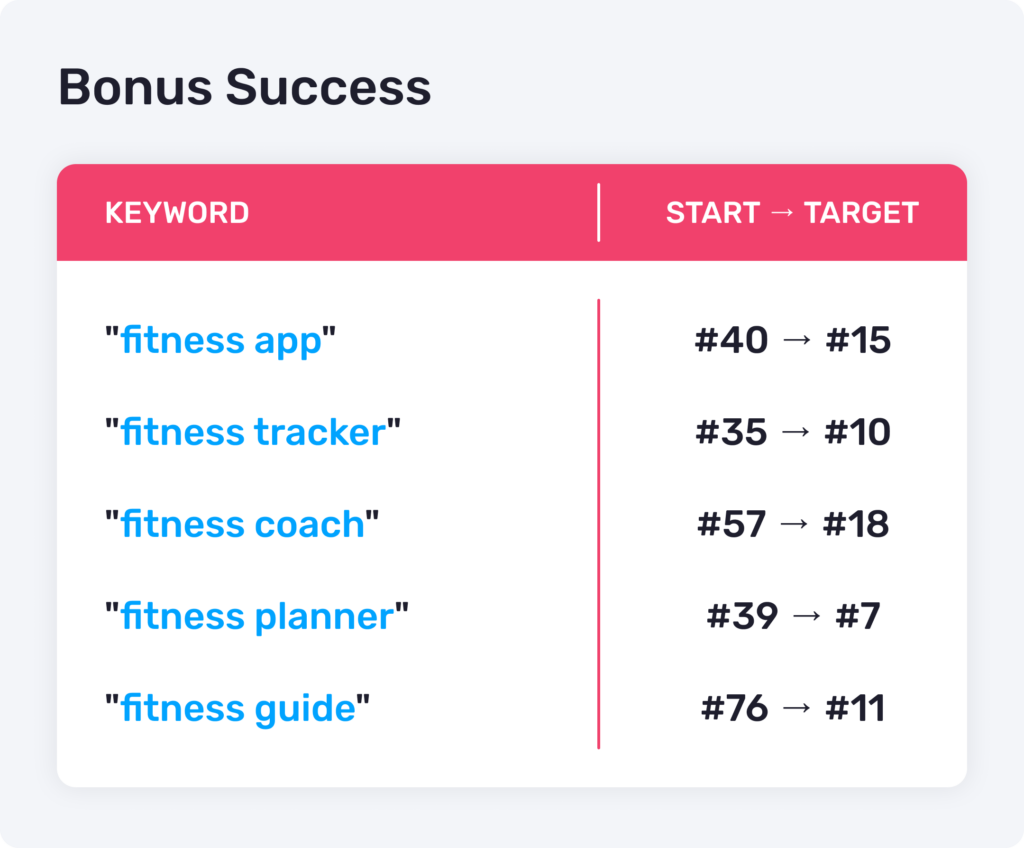
5 Critical Lessons for Mobile Marketers
This case study revealed several crucial insights that apply beyond just fitness apps or keyword promotion campaigns.
1. Technical Infrastructure is Part of Marketing Strategy
The most important lesson from this experience is that technical capacity must be considered as part of any app marketing strategy. It is essential to audit a technical setup before launching a major campaign to ensure their systems can handle the increased traffic. Make sure to build server capacity requirements into your campaign planning from the start.
2. Crisis Management Skills Are Essential
How you handle unexpected challenges often determines long-term client relationships and campaign success more than the original results. Therefore, in any crisis, quick and transparent communication is key. Focus on finding a solution, not assigning blame, and use the opportunity to showcase your expertise.
3. Reputation Recovery Can Be Faster Than Building
Our experience has shown that users are forgiving of technical issues when they are handled with transparency and professionalism. By addressing issues directly, focusing on engaging users who have had positive experiences, and framing technical improvements as a positive story, you can effectively manage sentiment and monitor your brand’s reputation as closely as your app’s rankings.
4. Proof of Concept Has Business Value
The server crash, though initially devastating, provided crucial business validation by proving genuine user demand in a way traditional research couldn’t. This crisis revealed key user engagement patterns and demonstrated our team’s resilience, turning a technical failure into a powerful argument for future growth and funding.
5. Algorithm Understanding Enables Recovery
Using our deep knowledge of Google Play’s algorithm, we created a strategy to recover from a major technical issue. We implemented campaigns focused on rebuilding engagement and improving reputation, while continuously monitoring key ranking factors to ensure a successful return.
Conclusion
This case study demonstrates that even severe setbacks in mobile marketing can be transformed into exceptional successes with the right strategic approach, technical understanding, and crisis management capabilities.The key to our success wasn’t avoiding problems — it was responding to them effectively and using the crisis as an opportunity to build a more robust, sustainable growth strategy.
At Keyapp, we specialize in keyword install campaigns and reputation management, but this experience reinforced how interconnected every aspect of app growth really is. Technical stability, user experience, store optimization, and marketing strategy must all work together to achieve sustainable success.Whether you’re launching a new fitness app or looking to improve existing rankings in competitive categories, the lessons from this case study can help you achieve sustainable organic growth while building the infrastructure needed to handle success. For another real-world look at how we conquer competitive niches, check out our other case study.
Ready to boost your app’s rankings? Contact Keyapp’s expert team to develop a comprehensive keyword promotion strategy just for your app.






















